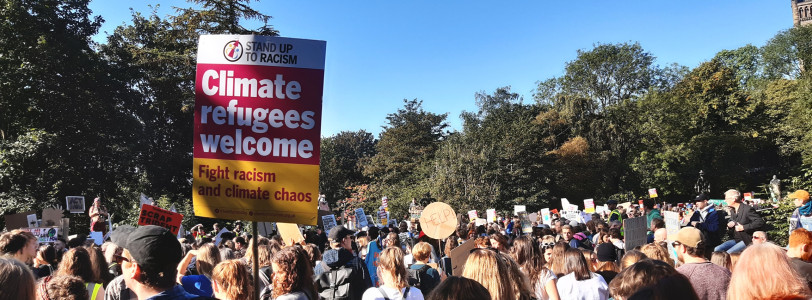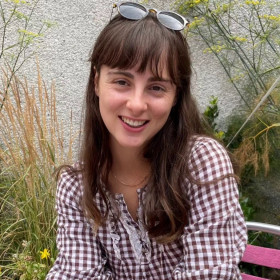Could you please introduce yourself to the reader?
My name is Silvia Behrens. I'm a social researcher at Glasgow Caledonian University, focusing on inequalities of gender and young people. Before my curent role, I focused very much on young people's activism in the UK, specifically on young people’s non-electoral participation. For my PhD at the University of Strathclyde, I worked with young people using an online survey where I had about 1000 respondents from across the UK. Then I followed up on this survey with some focus group research, specifically on different activist topics/ So these looked into anti-racism activism, climate change, and broadly speaking feminist and LGBTQ rights. It was really valuable to get an insight into the bigger picture of activism through this study.
Your academic work focuses on what motivates young people to engage in non-traditional forms of political participation. What drew you to this area of study?
I think there are two main explanations. One is my background in civic education for young people. Before my PhD, before I turned to research, I volunteered and worked in youth political education, mostly in Germany, focussing on democratic values. I was engaging with young people to get them to vote and also trying to understand why this is important, rather than just a call to action. What I noticed was that people who were already very interested, who were already voting, were already very much in favour of the system.
That led me to asking, who is missing? Where do I find these young people who have fallen through the cracks? This led me to thinking that I shouldn't just focus on voting and institutions. When I began my PhD research, I noticed there's a huge emphasis on voting generally, which is great. I definitely support voting in the electoral system. However, especially when it comes to young people, many of them are barred from voting. For example, 15 to 17-year-olds are ineligible to vote. Also, voting is very cyclical and a very formal act. Political self expression can contain so many other facets, other than just casting your vote at the ballot.
How does a sense of belonging, whether local or national, impact the political behaviour of young people?
I think it's quite a two way relationship. In my research, I have found that when it comes to political participation, that isn't voting, young people often cite a desire to belong and find their own place as a major motivation to engage in political activities. That is specifically related to activism when it was based around identity. So for example, young people who identified as LGBTQ plus, or young people who had very generically speaking, were identified as non-white. They said, I don't have anyone to talk about these issues for someone else and I want to find my place.
At the same time, when I was able to look at issues-based activism within climate change,these young people were also searching for belonging. I think a big part has to do with the transition from child to adult when young people are trying to find their place in a wider community. Once people found that belonging, a sense of having collective agency developed, which was really fascinating with regard to climate change. Due to togetherness and similar values, they felt they had greater power to hold the government or to hold politicians accountable.
In terms of what drives young people to engage in activism, from what my research participants discussed, often those people had negative experiences regarding either their identity or the issues they were passionate about. For example, a student going to ‘Fridays for Future’ marches may have a family who don’t approve of or understand their activism. I think experiences, which are tied to young people’s identity, influence or increase their awareness of political issues.
Other than direct action, what other political behaviours do you see as being popular with young people?
A lot of political participation is, of course, happening online and on social media. For example, signing petitions, sharing infographics and information about certain issues that are going on right now in the world. We can also see political consumerism, with people actively avoiding or supporting brands, which has the downside of issues like greenwashing or problems with marketing. Often, it's things that are accessible in everyday life. On the other side, some people do want to have a community, and it doesn't have to be necessarily directly political. So it can be things like volunteering which might be more social rather than outright political.
What prevents young people from voting in elections? This could be anything from political apathy to structural barriers.
I see two big issues preventing young people specifically in the UK from voting.
Firstly, the formalities and structures. You have to register to vote. I read some recent stats and I think that unfortunately about a third of young voters literally forgot to register in the last general election. Then there have also been recent changes in the laws on voter IDs. You have to present your ID to vote, which disadvantages young people in particular, because they might not have a passport. It also relates to some socio-economic issues because you might be less likely to have a passport or driving licence if you don’t need it or cannot afford it.
Secondly, I think there is a feeling amongst young people that they're being failed by politics or political institutions. In the UK, there is almost no focus on young people. Funding has always been cut. Young people might not always directly know all of these policies but they notice the impact in their communities. Political apathy is often used as an explainer to say that young people just don't care. Maybe they just don't care because they think no one cares for them in the first place. Why should they engage with a system that marginalises them?
"I think people's opinions are being heard, I just don't think that they are being conveyed by the politicians. In many situations, you see politicians do these empty gestures of ‘Oh yes, I stand with you’, ‘Oh yes, here is my performative activism’. If we were to go and look at their voting record, it would say something entirely different." (Paula, 16)
I want to add something positive. I don't believe that young people are an undemocratic or even anti-democratic generation. I think there's prejudice that young people just don't want to vote. Again, I think it’s about the system rather than this idea of democracy that they
reject. I think non-voting always benefits other people who don't have the interests of young people at heart. I think that not-voting is sort of like a waste of the voice that everyone, especially young people, have and you should have.
Do you think all young people are likely to vote alike in the next general election, or is it more complicated?
Young people are just as complex as the rest of the population. However, I do think that there are certain things that unify people. I think people very much care about material security which relates to the cost-of-living crisis. So I do think that young people will vote for parties that address these issues. Right now, at least in this very moment, the likelihood of young people voting Labour rather than the Conservative Party is rather high. However, all of these pre-election polls are pretty meaningless until we know the final results.
How do political events impact the political maturity and opinions of young people?
Political life cycles suggest that when you're young, you're less likely to vote and when you're old, you’re very likely to vote. There are also ideas that generations, these very broad concepts, are defined by things that have happened when a generation grows up together. For example, Brexit has been quite incisive. Now I think the pandemic has very much shaped how young people feel about their own selves, their own security, the security of the world. Uncertainty, specifically also for young people, has impacted how they perceive the world and world politics. These impressions of uncertainty, which remain with the cost-of-living crisis, for example, do play a great role and at least affect the issues that young people look like in the most important.
What is your encouragement to young people that youth voice matters?
If young people don't use their voice, and that includes voting but also maybe other forms of political expression, there's not many other people that will stand up for them unfortunately, Young people in politics has often not been prioritised. So I can only encourage young people to find maybe their passion, maybe a topic of interest to them, and see what they can do about it. It’s also important to find groups to join and find spaces to express yourself, without that ultimate goal of changing the world, because the steps in between really matter.
The Young Vote
Voice is on a mission to understand what you want from the next government, what issues are important to you at the next election and whether or not you're likely to vote. Whether you care about politics, or don't care at all,we want to hear from you.
To share your thoughts, participate in The Young Vote Survey. If you need extra incentive, it'll take under 10 minutes and you can win one of two £40 vouchers.









0 Comments